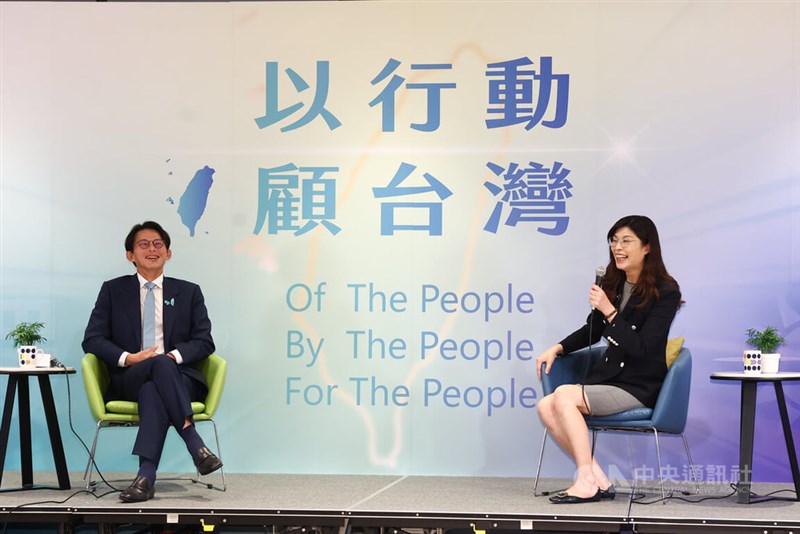
Taipei, Nov. 19 (CNA) The leaders of Taiwan's opposition Kuomintang (KMT) and Taiwan People's Party (TPP) met Wednesday to discuss the prospects for collaboration in the 2026 local elections.
Speaking during their public meeting in New Taipei, KMT Chairperson Cheng Li-wun (鄭麗文) told TPP Chairman Huang Kuo-chang (黃國昌) that she hoped the parties' recent cooperation in the Legislature would deepen in the run-up to local elections.
Beyond merely promoting the best candidates, Cheng said she hoped for a partnership in which "one plus one equals more than two -- a comprehensive collaboration with no blind spots, in which each side makes up for the other's weaknesses."
Cheng acknowledged "difficulties" in previous efforts toward a KMT-TPP alliance, but said the opposition parties could not afford to be discouraged or to pursue selfish motives.
Despite not knowing Huang well previously, Cheng said that after meeting him, she felt strongly that they were on the same page.
"I hope that [the KMT and TPP] can cooperate within a short period of time to win an election using a democratic, fair, and transparent system with regard to policies and candidates," she said.
Huang, meanwhile, said that while the TPP and KMT had "different pasts, backgrounds and policies," this would not hinder them from working together for Taiwan and its people.
Competition between the two parties "is not a zero-sum game," he said.
Huang said the TPP would act with "utmost sincerity" to seek the "best system for selecting the strongest team [of candidates]."
To that end, he said, he would direct the TPP's think tank to reach out to its KMT counterpart to discuss local governance and the parties' 2026 election goals.
The idea of an alliance between the two opposition parties dates back to Taiwan's 2024 presidential elections, when the KMT and TPP presidential candidates -- Hou Yu-ih (侯友宜) and Ko Wen-je (柯文哲) -- came under pressure to run on a joint ticket.
Negotiations on the joint ticket ultimately fell apart at a televised press conference less than two months before the election, as neither candidate was willing to take the vice presidential slot.
The results of the Jan. 13, 2024 election, however, suggested that a joint ticket may have been successful, as Lai Ching-te (賴清德) of the ruling Democratic Progressive Party (DPP) won with 40.05 percent of the votes, but Hou's and Ko's votes combined amounted to around 60 percent, with Hou winning 33.49 percent and Ko taking 26.46 percent.
Despite that failure, the KMT and TPP have sometimes joined forces in the Legislature, where they now hold a combined majority of the 113 seats.
The two parties have also increasingly warmed to the idea of collaborating in the November 2026 local elections, and even forming what they have called a "unity government" after the 2028 national elections.
Discussing the latter idea on Wednesday, Cheng said such an arrangement would not look like some of the parliamentary governments in Europe, but rather like the dual executive system in France.
Asked about the TPP's statements that it wanted to reach a cooperation agreement with the KMT by March, Cheng said she thought such a timeframe was "reasonable."
Meanwhile, DPP spokesperson Wu Cheng (吳崢) dismissed the opposition leaders' meeting as an "anti-DPP struggle session," which he said had not done anything to unite or advance the country.
-
Politics
U.K., German offices in Taiwan mark 228 Peace Memorial Day
02/28/2026 06:33 PM -
Politics
Lin Family killing archives declassified, but key evidence destroyed: Lai
02/28/2026 06:26 PM -
Politics
KMT names Wu Tsung-hsien as candidate in Yilan magistrate race
02/28/2026 05:24 PM -
Business
Taiwan ranks No. 2 in global startup business environment: GEM
02/28/2026 04:55 PM -
Society
Taiwan warns against Middle East travel as tensions with Iran escalate
02/28/2026 03:26 PM